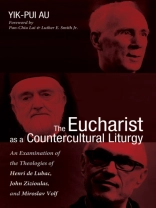Since its institution, the Eucharist has been celebrated in all churches regardless of denominational differences. Yet its importance should not be just confined to the Christian communities; it can have transformational power in the cultural milieu. In this book, Yik-Pui Au argues that the Eucharist can be a countercultural liturgy that upholds the identity and values of Christianity by countering cultural currents that are contrary to the Christian faith. Au takes an interdisciplinary approach comprised of church history, ritual theory, and theology of culture to examine systematically the countercultural functions of the Eucharist interpreted by three modern theologians, Henri de Lubac, John Zizioulas, and Miroslav Volf, representing the Catholic, Orthodox, and Protestant traditions respectively. The comparative evaluation of this cross-tradition analysis supports Au’s argument that even though culture is complex and changing, the countercultural function of the Eucharist remains valid. Despite its complexity, culture can be transformed by the Eucharist and it can also challenge and renew our understanding of the Eucharist. She suggests that due to its richness, the countercultural function of the Eucharist cannot be exhausted by one tradition. It is the task of theologians to help the church continually venture to explore and vivify this function ecumenically.
عن المؤلف
Luther E. Smith, Jr. is Professor of Church and Community at the Candler School of Theology of Emory University, Atlanta, Georgia. Dr. Smith writes and speaks extensively on issues of church and society, congregational renewal, Christian spirituality, and the thought of Howard Thurman. He is the author of Howard Thurman: The Mystic as Prophet (Friends United Press) and editor of Howard Thurman: Essential Writings (Orbis Books).







![غلاف Brian Schrag & Julisa Rowe: Community Arts for God's Purposes [Chinese] 貼近神心意的社群藝術 غلاف Brian Schrag & Julisa Rowe: Community Arts for God's Purposes [Chinese] 貼近神心意的社群藝術](https://static.worldofdigitals.com/thumb_webp/740/9781645083740.webp)




